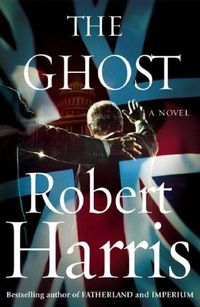 A LETTER TO THE LUMINOUS DEEP |
 April's Affections and Intrigues: Love and Mystery Bloom |

Purchase
Simon & Schuster Suspense, Fiction Excerpt of The Ghost by Robert HarrisONE Of all the advantages that ghosting offers, one of the
greatest must be the opportunity that you get to meet
people of interest. THE MOMENT I HEARD how McAra died, I should have walked away. I can see that now. I should have said, "Rick, I'm sorry, this isn't for me, I don't like the sound of it," finished my drink, and left. But he was such a good storyteller, Rick -- I often thought he should have been the writer and I the literary agent -- that once he'd started talking there was never any question I wouldn't listen, and by the time he had finished, I was hooked. The story, as Rick told it to me over lunch that day, went like this: McAra had caught the last ferry from Woods Hole, Massachusetts, to Martha's Vineyard two Sundays earlier. I worked out afterward it must have been January the twelfth. It was touch-and-go whether the ferry would sail at all. A gale had been blowing since midafternoon and the last few crossings had been canceled. But toward nine o'clock the wind eased slightly, and at nine forty-five the master decided it was safe to cast off. The boat was crowded; McAra was lucky to get a space for his car. He parked belowdecks and then went upstairs to get some air. No one saw him alive again. The crossing to the island usually takes forty-five minutes, but on this particular night the weather slowed the voyage considerably: docking a two-hundred-foot vessel in a fifty-knot wind, said Rick, is nobody's idea of fun. It was nearly eleven when the ferry made land at Vineyard Haven and the cars started up -- all except one: a brandnew tan-colored Ford Escape SUV. The purser made a loudspeaker appeal for the owner to return to his vehicle, as he was blocking the drivers behind him. When he still didn't show, the crew tried the doors, which turned out to be unlocked, and freewheeled the big Ford down to the quayside. Afterward they searched the ship with care: stairwells, bar, toilets, even the lifeboats -- nothing. They called the terminal at Woods Hole to check if anyone had disembarked before the boat sailed or had perhaps been accidentally left behind -- again: nothing. That was when an official of the Massachusetts Steamship Authority finally contacted the Coast Guard station in Falmouth to report a possible man overboard. A police check on the Ford's license plate revealed it to be registered to one Martin S. Rhinehart of New York City, although Mr. Rhinehart was eventually tracked down to his ranch in California. By now it was about midnight on the East Coast, nine p.m. on the West. "This is the Marty Rhinehart?" I interrupted. "This is he." Rhinehart immediately confirmed over the telephone to the police that the Ford belonged to him. He kept it at his house on Martha's Vineyard for the use of himself and his guests in the summer. He also confirmed that, despite the time of year, a group of people were staying there at the moment. He said he would get his assistant to call the house and find out if anyone had borrowed the car. Half an hour later she rang back to say that someone was indeed missing, a person by the name of McAra. Nothing more could be done until first light. Not that it mattered. Everyone knew that if a passenger had gone overboard it would be a search for a corpse. Rick is one of those irritatingly fit Americans in their early forties who look about nineteen and do terrible things to their body with bicycles and canoes. He knows that sea: he once spent two days paddling a kayak the entire sixty miles round the island. The ferry from Woods Hole plies the strait where Vineyard Sound meets Nantucket Sound, and that is dangerous water. At high tide you can see the force of the currents sucking the huge channel buoys over onto their sides. Rick shook his head. In January, in a gale, in snow? No one could survive more than five minutes. A local woman found the body early the next morning, thrown up on the beach about four miles down the island's coast at Lambert's Cove. The driver's license in the wallet confirmed him to be Michael James McAra, age fifty, from Balham in south London. I remember feeling a sudden shot of sympathy at the mention of that dreary, unexotic suburb: he certainly was a long way from home, poor devil. His passport named his mother as his next of kin. The police took his corpse to the little morgue in Vineyard Haven and then drove over to the Rhinehart residence to break the news and to fetch one of the other guests to identify him. It must have been quite a scene, said Rick, when the volunteer guest finally showed up to view the body: "I bet the morgue attendant is still talking about it." There was one patrol car from Edgartown with a flashing blue light, a second car with four armed guards to secure the building, and a third vehicle, bombproof, carrying the instantly recognizable man who, until eighteen months earlier, had been the prime minister of Great Britain and Northern Ireland. THE LUNCH HAD BEEN Rick's idea. I hadn't even known he was in town until he rang me the night before. He insisted we meet at his club. It was not his club, exactly -- he was actually a member of a similar mausoleum in Manhattan, whose members had reciprocal dining rights in London -- but he loved it all the same. At lunchtime only men were admitted. Each wore a dark blue suit and was over sixty; I hadn't felt so young since I left university. Outside, the winter sky pressed down on London like a great gray tombstone. Inside, yellow electric light from three immense candelabra glinted on dark polished tables, plated silverware, and rubied decanters of claret. A small card placed between us announced that the club's annual backgammon tournament would be taking place that evening. It was like the changing of the guard or the houses of parliament -- a foreigner's image of England. "I'm amazed this hasn't been in the papers," I said. "Oh, but it has. Nobody's made a secret of it. There've beenobituaries." And, now I came to think of it, I did vaguely remember seeing something. But I had been working fifteen hours a day for a month to finish my new book, the autobiography of a footballer, and the world beyond my study had become a blur. "What on earth was an ex-prime minister doing identifying the body of a man from Balham who fell off the Martha's Vineyard ferry?" "Michael McAra," announced Rick, with the emphatic delivery of a man who has flown three thousand miles to deliver this punch line, "was helping him write his memoirs." And this is where, in that parallel life, I express polite sympathy for the elderly Mrs. McAra ("such a shock to lose a child at that age"), fold my heavy linen napkin, finish my drink, say good-bye, and step out into the chilly London street with the whole of my undistinguished career stretching safely ahead of me. Instead I excused myself, went to the club's lavatory, and studied an unfunny Punch cartoon while urinating thoughtfully. "You realize I don't know anything about politics?" I said when I got back. "You voted for him, didn't you?" "Adam Lang? Of course I did. Everybody voted for him. He wasn't a politician; he was a craze." "Well, that's the point. Who's interested in politics? In any case, it's a professional ghostwriter he needs, my friend, not another goddamned politico." He glanced around. It was an iron rule of the club that no business could be discussed on the premises -- a problem for Rick, seeing as he never discussed anything else. "Marty Rhinehart paid ten million dollars for these memoirs on two conditions. First, it'd be in the stores within two years. Second, Lang wouldn't pull any punches about the war on terror. From what I hear, he's nowhere near meeting either requirement. Things got so bad around Christmas, Rhinehart gave him the use of his vacation house on the Vineyard so that Lang and McAra could work without any distractions. I guess the pressure must have gotten to McAra. The state medical examiner found enough booze in his blood to put him four times over the driving limit." "So it was an accident?" "Accident? Suicide?" He casually fl icked his hand. "Who'll ever know? What does it matter? It was the book that killed him." "That's encouraging," I said. While Rick went on with his pitch, I stared at my plate and imagined the former prime minister looking down at his assistant's cold white face in the mortuary -- staring down at his ghost, I suppose one could say. How did it feel? I am always putting this question to my clients. I must ask it a hundred times a day during the interview phase: How did it feel? How did it feel? And mostly they can't answer, which is why they have to hire me to supply their memories; by the end of a successful collaboration I am more them than they are. I rather enjoy this process, to be honest: the brief freedom of being someone else. Does that sound creepy? If so, let me add that real craftsmanship is required. I not only extract from people their life stories, I impart a shape to those lives that was often invisible; sometimes I give them lives they never even realized they had. If that isn't art, what is? I said, "Should I have heard of McAra?" "Yes, so let's not admit you haven't. He was some kind of aide when Lang was prime minister. Speechwriting, policy research, political strategy. When Lang resigned, McAra stayed with him, to run his offi ce." I grimaced. "I don't know, Rick." Throughout lunch I'd been half watching an elderly television actor at the next table. He'd been famous when I was a child for playing the single parent of teenage girls in a sitcom. Now, as he rose unsteadily and started to shuffle toward the exit, he looked as though he'd been made up to act the role of his own corpse. That was the type of person whose memoirs I ghosted: people who had fallen a few rungs down the celebrity ladder, or who had a few rungs left to climb, or who were just about clinging to the top and were desperate to cash in while there was still time. I was abruptly overwhelmed by the ridiculousness o... Excerpt from The Ghost by Robert Harris |
|
| |||
|
||||



 © 2003-2024
© 2003-2024